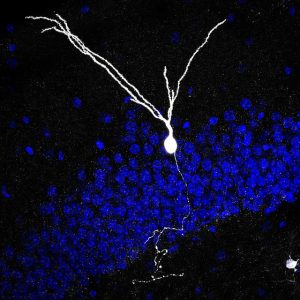Axons Found To Be Important In Recovering From TBI
A new study is particularly relevant to military soldiers who experience blast-related traumatic brain injury. More than 200,000 U.S. soldiers serving in the Middle East have experienced this type of injury. Researchers from the University of Iowa discovered something that may help with preventing the development of chronic neurological symptoms that can come after injury, finding their answers in the axons.

An image of the axons of granule cells is shown here. The axons pass messages from the cell body of a neuron to other cells. (Flickr / Creative Commons / Jason Snyder)
Axonal degeneration is one of the early events in blast-mediated TBI. The research has demonstrated that protecting axons prevents long-term neuropsychiatric problems. The long-term neurological problems that can develop from a TBI include vision, coordination, memory, mood, and thinking. Axons are the thread-like projections that pass messages from the cell body to other cells.
The researchers were wondering whether or not damage to axons was simply a consequence of brain injury or a driving cause of neurological symptoms. To study this question, they used mice with a mutation that protects axons from some kind of damage. They used a mutation that maintains normal levels of a metabolite called nicotinamide adenine dinucleotide, or NAD.
They simulated a blast-mediated TBI in mice, and found that the mice with the mutation were protected from the neurological problems. They did not develop the vision, thinking, and movement problems that the mice without the mutation developed. Therefore, they learned that the axons must be a driving force in neurological problems after TBI.
Andrew Pieper, professor of psychiatry at the University of Iowa Carver College of Medicine, led the study. He said that therapeutic treatments targeted at protecting the axons may be a beneficial approach to preventing neurological problems after blast exposure. The current study has built upon previous research from Pieper’s lab.
The researchers have discovered a myriad of neuroprotective compounds that seem to help axons survive the kind of early damage seen in TBI. The compounds help to preserve NAD, which is critical to the health of axons. The team has shown that the compounds prevent axonal degeneration and protect mice from neurological problems, even when administered 24 to 36 hours after blast injury.
The results of the recent study were published October 11th in the journal eNeuro.